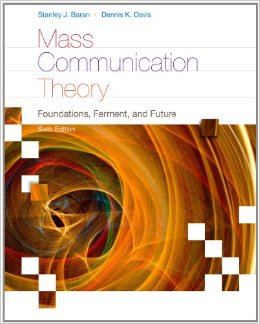Mass Communication Theory Foundations, Ferment, and Future Review of Chaper 1: DEFINING AND REDEFINING MASS COMMUNICATION When an organization (Source) employs a technology as a medium to communicate with a large audience, mass communication is said to have occurred. SCIENCE AND HUMAN BEHAVIOR Implementation of the scientific method is difficult for those studying the social world for four reasons: Most of the significant and interesting forms of human behavior are quite difficult to measure. How do we measure something like civic duty? Should we count the incidence of voting? Maybe a person’s decision not to vote is her personal expression of that duty. Try something a little easier, like measuring aggression in a television violence study. Can aggression be measured by counting how many times a child hits a rubber doll? Is gossiping about a neighbor an aggressive act? How do we measure an attitude (a predisposition to do something […]
Mass Media Research By WIMMER & DOMINICK
Mass Media Research By ROGER D. WIMMER & JOSEPH R. DOMINICK 9th Edition Part One The Research Process Chapter 1 Science and Research 1 Chapter 2 Elements of Research 42 Chapter 3 Research Ethics 64 Chapter 4 Sampling 86 Part Two Research Approaches Chapter 5 Qualitative Research Methods 114 Chapter 6 Content Analysis 155 Chapter 7 Survey Research 184 Chapter 8 Longitudinal Research 218 Chapter 9 Experimental Research 238 Part Three Data Analysis Chapter 10 Introduction to Statistics 266 Chapter 11 Hypothesis Testing 289 Chapter 12 Basic Statistical Procedures 304 Part Four Research Applications Chapter 13 Newspaper and Magazine Research 332 Chapter 14 Research in the Electronic Media 350 Chapter 15 Research in Advertising 380 Chapter 16 Research in Public Relations 405 Preface: Things change constantly in all areas of life, and it is sometimes difficult to keep up with all the changes. In every edition of this text, we […]
Communication Research By National Open University of Nigeria
Communication Research By National Open University of Nigeria in pdf format www.nou.edu.ng Module 1 Introduction Unit 1 The Meaning of Research and the Scientific Method Unit 2 Application of the Scientific Principles to Social Research Unit 3 Characteristics of and the Development of Mass Media Research Unit 4 Classification of Research Module 2 The Elements of Research Unit 1 Concepts, Constructs, Hypotheses/Research Questions and Instrumentation. Unit 2 Variables Unit 3 Measurement, Scales and Indexes Module 3 Major Communication Research Methods Unit 1 Experimental Research Unit 2 Survey Research Unit 3 Content Analysis Unit 4 Case study Unit 5 Observational Research Module 4 Sampling Unit 1 Meaning and Types of Sampling Unit 2 Population and Sample Unit 3 Sample Size and Sampling Error Module 5 The Research Procedure Unit 1 The Research Proposal Unit 2 Data Analysis in Communication Research Unit 3 Documentation in Communication Research Module 6 Areas of Mass […]
Political Communication
Chapter 2: Political Communication – Review is the process by which language and symbols, employed by leaders, media, or citizens, exert intended or unintended effects on the political cognitions, attitudes, or behaviors of individuals or on outcomes that bear on the public policy of a nation, state, or community. There are several aspects of the definition. Political communication is a process Political communication calls centrally on words and symbols (A symbol is a form of language in which one entity represents an idea or concept, conveying rich psychological and cultural meaning.) Group of leaders and Influence agents Political communication effects can be intended or unintended. Political communication is that effects occur on a variety of levels. ( Political media exert influence on the micro level, affecting individuals’ thoughts, candidate assessments, feelings, attitudes, and behavior.) CONTEMPORARY POLITICAL COMMUNICATION One view is that elite leaders exert a preeminent impact on opinions and […]
The Panoply of Political Communication
Chapter 1 • The Panoply of Political Communication Classical Direct Democracy Athenian democracy was distinctive, unique in its time. It also has articulated key principles that have guided subsequent democratic theories and underpin contemporary democratic governments. The philosopher Aristotle endorsed this view, arguing that human beings were political animals. But he did not mean that people were political in the sense we sometimes use the term today—networking and conniving to gain advantage over others. Aristotle believed that the good life consisted of participation with others on common tasks and deliberating in public to determine just outcomes for the larger community. Liberal Democratic Theory: Liberal democratic theories evolved in the 17th and 18th centuries as people grew frustrated with the power of absolutist rulers and the many ways that European monarchies stifled individual freedom. Democratic government emerged as a way to protect individuals from oppressive use of political power. Liberal perspectives on democracy emphasize the […]
Theory and Research in Mass Communication: Contexts and Consequences
Theory and Research in Mass Communication: Contexts and Consequences By David K. Perry Second Edition Citizens, policymakers, and communication practitioners who are concerned about mass communication issues otfutrenn t o the academic community for answers. Their questions often involve such things as whether, to what extent, or why media violence or sex contributote asn tisocial or criminal behavior among audiences. The answers often are not as simple or consistent as they might like. As one scholar put it: only after much research has been completed does a statement come tboe viewed int he scholarly community as tru-ea status very few communication theories are ever likely to reach. Even then, the truth value is to be found more in the degree of agreement among scholars, an intersubjective criterion, than in any ultimate reality. (Chaffee, 1991, p. 11) Definitions of truth as scholarly consensus are often found in modem literatures of the history […]
